In today’s competitive U.S. market for nearly any goods under the sun, it’s already difficult enough to ensure that your shipping goes according to plan every time. Sometimes there are just factors outside of your control that nothing can be done about. On the other hand, there are a variety of common shipping mistakes made — by both the carrier and customer — that can help avoid any self-inflicted miscues that can cost you, your freight and also money.
These common shipping mistakes range from improperly packaged items to inaccuracies on important shipping documents can really prevent a business from fully realizing its potential. But these 12 mistakes are actually easily preventable and most take little more than dedication to eliminate. Keep reading for each mistake’s solution.
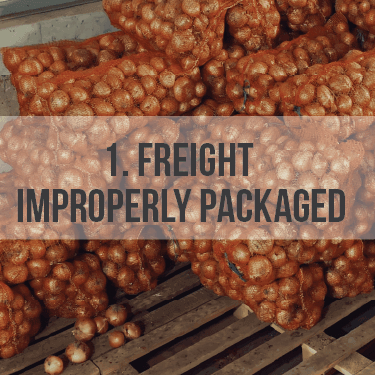
You might hear the words “costly” or “expensive” many times throughout the course of this article, as any one of these 12 common shipping mistakes — if made — will result in the possibility of additional money leaving the wallets of customers or freight transportation providers alike.
But let’s start here with a common shipping folly that can really put a damper on the day — freight not being packaged properly. This mistake can lead to a few things happening, none of which will be beneficial:
As the entity having your goods transported in this case, your aim should be simple: to package your items as efficiently as possible in an effort to minimize loss while also keeping an eye on the cost of packaging.
The most likely outcome for improperly packaging your freight is that the seller or manufacturer of the products will be the ones on the hook for any damage, not the freight hauler. So while it might cost a little bit more of an investment upfront, that will be peanuts in comparison to having a bunch of damaged goods returned.
Make sure your freight is properly packaged; this means boxes and packaging materials that are both size- and protection-appropriate for the commodity. This could also mean, if shipping food products, packaging that still protects while offering ventilation if required. Whatever is decided, the freight’s owner should best know how it should protect its unique commodities and plan accordingly in its packaging.
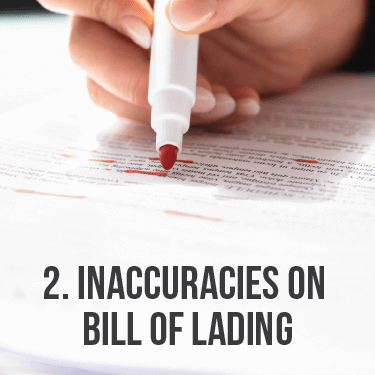
The bill of lading (BOL) acts as the receipt during shipment and is included with the cargo. It has a wealth of information about the transported goods that is helpful in providing identifying information, and is considered a legal document sent to the shipper by the freight carrier. This includes:
Suffice to say, any inaccuracies in the furnishing of the above information could lead to major issues between the two parties. Since it is seen as a legally binding document, the BOL can be used in potential litigation to prove or disprove the terms of the agreement. Because of the BOL’s level of importance, great lengths are taken to make sure the information on it is both accurate and complete.
The main reason for this is as a measure and deterrent against freight theft. Furthermore, if the info on the BOL is a simple mistake, then that gives the two parties the chance to make things right before the acceptance of a shipment or to rectify any misunderstandings.
It is really to the benefit of both the carrier and items’ owner to include a BOL and also really make a concerted effort for everything it contains to be right the first time, every time.
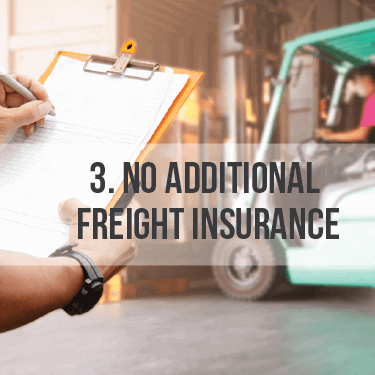
Usually the cost of a full truckload provides some level of insurance. However, that represents basic coverage where the freight company would have to be found at fault for damage or loss. As the party having your freight shipped, it could be a double whammy — your freight has been damaged, so at the very least, you lose the time it took to buy or produce it; then if it’s not covered, you can also be out the money.
It’s crucial to protect your own freight against not only normal damage or loss during transit, but even things like natural disasters (referred to as Acts of God) or just plain human error. You also have options in this area for how much coverage you think you need and where you purchase that additional insurance from. You can choose to go through the third-party logistics (3PL) company that is already providing the freight transport or go to another company.
Unless you flat out cannot afford to buy additional freight insurance, this is one of the easier mistakes to not make. You’ll be covered and not heartbroken if anything unexpected befalls your shipment.
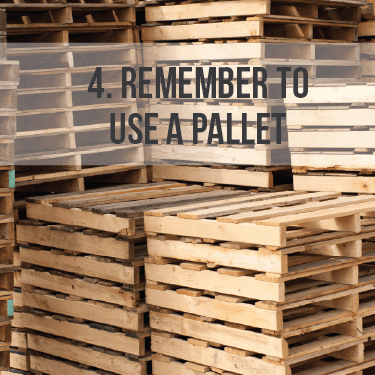
As discussed previously, improperly packaging your freight can have unwelcome consequences. The same can be true of forgetting or neglecting to palletize your items.
Palletizing your freight has a number of advantages:
The less your freight is handled and the more stable it is during all parts of its journey, the greater chance it has of arriving in great condition. If one worker can skillfully unload a pallet with 100 boxes on it, that will always be preferable to a host of workers handling each individual box.
It’s understandable that not every commodity would be best served from being on pallets. But if yours is a product that would benefit from being palletized, it’s on you to avoid the mistake of going in the opposite direction.
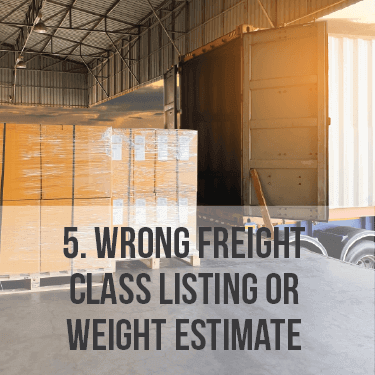
Freight classes exist for safety reasons. If you give the carrier the freight class number for bananas, but you are actually shipping lithium ion batteries, it would be evident how that would be a fair-sized blunder.
You must make sure to nail the freight class you’re expecting to have shipped so the carrier can be totally prepared for your commodity.
Moving onto weight estimates, It could cause the shipment to cost more since the more freight being carried, the more it will conceivably cost. Also 18-wheelers themselves have weight capacities, as do roads and interstates.
It can work the other way as well. If you tell a freight carrier you have 40,000 pounds of goods to ship but it ends up being 30,000 pounds, you’ll have been quoted a higher price — and possibly paid it — than you would have because you overestimated the amount of freight.
It would even change the way the truck is loaded, since weight distribution should be fairly even over the 18-wheeler’s axles. Regardless, if you underestimate the amount of weight, your price quote will be inaccurate and you’ll end up with a higher quote. If you overestimate the weight, you might end up paying for freight capacity you didn’t need.
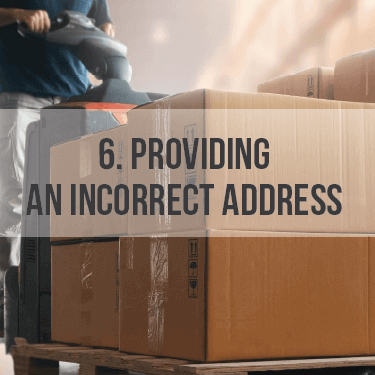
This is a big one and one, with an elevated amount of care, that can be avoided. The most obvious impact of not having the right address for where your freight will end up is that it ends up not being able to be delivered, at least not in a timely manner.
But the second, less thought-of consequence of giving a wrong address from the customer standpoint is how it will affect the price to have your freight hauled. There are many different components that go into the price quote of a freight load, one of which is the exact distance between points A and B.
If a simple mistake of the zip code on one of the addresses being incorrect happens, it could result in an initial price quote that is not accurate. So you might think you’re paying one price and be surprised to find out later it was more, because yourself or an employee of yours wrote a 6 instead of a 7.
Double-checking addresses and also making sure they’re completely legible are two surefire ways to drastically reduce the occurrence of a wrong address. Or if you’re giving the address to a freight agent during booking, you can even ask to email them the addresses or just confirm by asking them to repeat them back to you.
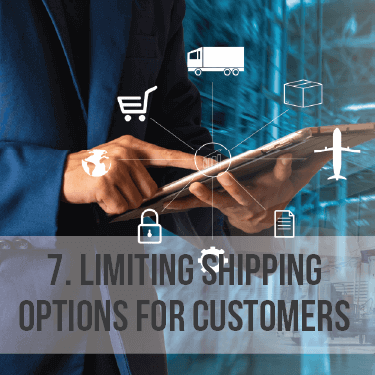
Shipping is never a one-size-fits-all proposition in relation to customers’ needs. So a freight shipping company can’t offer just one kind of shipping without any nuance involved for the many different requirements for all of the different goods being shipped across the world. For instance, it would be easiest for all involved if all products could be shipped via a standard 18-wheeler. However, that’s a dream that can’t match reality.
A forward-thinking 3PL will offer a variety of different shipping options so that its business owners can choose the one that fits them the best. For instance, here are several different types of freight shipping that people regularly require:
As the freight shipping provider, it could be a costly miscue if you’re not able to offer multiple different kinds of shipping. You will miss out on customers and the profitability that comes with that. So be as flexible as possible, while also offering the variety that customers both want and need.

Offering free shipping as a retailer or wholesaler can actually be a great way to entice customers to buy your products, so this tactic is not generally thought to be a mistake. However, where it is a mistake is if it affects your business’s bottom line negatively.
It’s not advisable to use the lure of free shipping to hook customers if you end up doing so at an overall loss to yourself. True, your competitors might have free shipping as a feature but if you aren’t able to beat them on quality, overall price — or perhaps both — you may need to rethink how you expect to compete overall.
A 3PL will not be giving their customers free shipping, so it is going to cost you dollars to move it. So again, it’s not being suggested to never offer free shipping. This tip is just to reinforce that to do so at a personal loss to your enterprise’s finances is a mistake and shouldn’t be done unless you can still make a profit or if it’s part of some overall strategy that’s been planned out in advance.

This one can cut both ways, in terms of it being a shipping mistake that both freight shipping providers and their customers are each capable of making. And we’ve talked already about miscues that can be financially hurtful — getting fined or even banned from being able to transport or have goods transported can really hit where it hurts.
The U.S. Department of Transportation (DOT) regulates the trucking industry under a branch called the Federal Motor Carrier Safety Administration (FMCSA). The FMCSA provides oversight that those who operate commercial motor vehicles (CMVs) are driving and transporting freight safely.
Whether it is intentionally or accidentally, running afoul of the FMCSA guidelines can see an individual driver or even a 3PL be subject to monetary fines, suspensions or even total revocation of driving privileges. Also, each state also has its own department of transportation while cities and towns have local laws that cover any type of motorist.
There are other governmental agencies in the U.S. that might not oversee the actual wheels rolling along the road, but rather how the freight itself is packaged and handled. An example of this is the Food and Drug Administration, which has regulations on how food and medicine are required to be handled during shipment. There are many instances where this comes into play.
Also HAZMAT has extremely specific laws governing exactly how it must be handled and any violation there can be costly, in terms of money and the health of the public.
A 3PL should have drivers who know the rules, so that’s their easiest way to avoid these types of errors. As the owner of the freight, it is up to you to do the same. You should learn best practices and the laws regarding the commodities you plan on having transported.
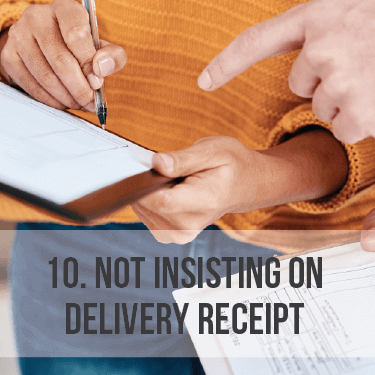
Delivery receipt is basically an end-of-shipment inspection that assesses if any damage was caused to freight during transportation and if the freight carrier holds any liability in this. In most cases, the party accepting the goods at the destination will sign off when taking a delivery that is in good physical standing, and that the freight on the truck is what was expected, from the correct shipper.
While this is a great practice that protects all involved and should occur each time, the reality is that it doesn’t. This is a misstep that can hurt heavily if the agreed-upon freight doesn’t arrive, or if less of the goods than planned on are missing. Also, without a delivery receipt (or even if one exists, but it’s unsigned), it will be hard to prove after the fact if damage is found that it was the carrier’s fault.
That’s why not insisting that a delivery receipt be included can be an extremely unfortunate oversight
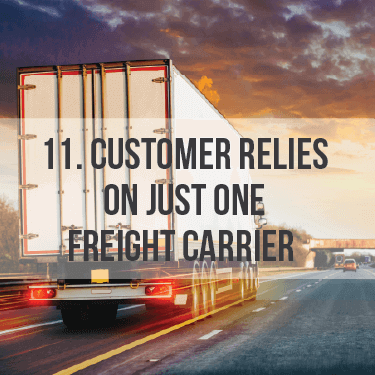
In the current climate, many customers and freight capacity providers are dealing with a similar issue: finding empty 18-wheelers with drivers. There are very few unaffected by this tough condition, which means you should be in the dating phase of looking around for freight transportation so you don’t get stuck without it.
There’s nothing wrong with settling on a great 3PL that always comes through and who you’ve got a good working relationship with. That’s not a mistake — where the mistake could happen, though, is if you’re unable to quickly book a load.
Having a diverse set of strategic partners increases your chances of booking a load overall, and especially when you need one. Besides solely boosting the odds of securing vital trucking capacity, it allows you to compare the different services each 3PL offers and also do some comparison shopping based on price.
As the party who needs freight shipped, putting yourself in the best possible position by not tying yourself down is the smart choice. Right now, everything in the logistics industry is tighter with limited capacity, delays, etc. Don’t make the error of not exploring all your options to ensure your freight has a truck to be on.
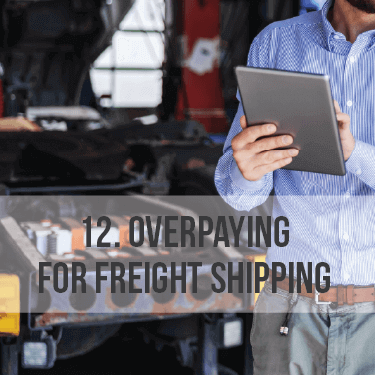
Shipping freight is a huge part of not only getting your commodities where your customers are, but an aspect of the process where you can both save money or that can enhance the profitability of your products if you pick a highly competent carrier. Unhappy customers with products damaged during transit will turn those cheap shipping rates into unintended instances of more expensive shipping.
So in this case, overpaying doesn’t mean just spending more money than the absolute lowest quote available. It’s about assessing everything included in the freight load and getting the best value for the price you’ll pay.
The lowest price might contain strictly the bare minimum level of service, insurance and possibly effort in the delivery and level of care your shipment receives. For some businesses, that will be perfectly fine and all they require. For others, though, a level of professionalism and attention to detail, along with additional features like readily available customer service and real-time GPS tracking, are worth an extra reasonable cost.
While no carrier can claim 100 percent on-time delivery rate, some are definitely better than others in this regard. If that’s an important trait for a potential carrier to have — and it should be — you should definitely balance that with any added cost incurred.
In conclusion, it’s not always about getting a rock-bottom freight rate. But make sure you are getting what’s needed for your goods from a transportation standpoint and that you’re shopping around with the goal of unknowingly overpaying for it. Avoiding these mistakes will help you overcome shipping delays and keep your supply chain strong.
After learning the potential pitfalls of the 12 most common shipping mistakes, link up with a partner you can trust to do things the right way in R+L Global Logistics. Not only is it our mission to limit any freight hauling hiccups but also to help guide you as our customer to do the same.
R+L Global Logistics can give you access to any kind of freight shipping you need, whether it be regular truckload shipping or any one of our specialty shipping services like expedited, refrigerated, heavy haul, oversized, flatbed and more. Since we partner with the best drivers in the industry, your load will arrive on time and in great condition, so it’s one less thing to worry about.
So once you’re done making common shipping mistakes, see how counting on R+L Global Logistics to help handle all your transportation needs will be the best call you can make. For a free quote, call today at (866) 353-7178.
R+L Global Logistics
315 NE 14th St., Ocala, FL 34470